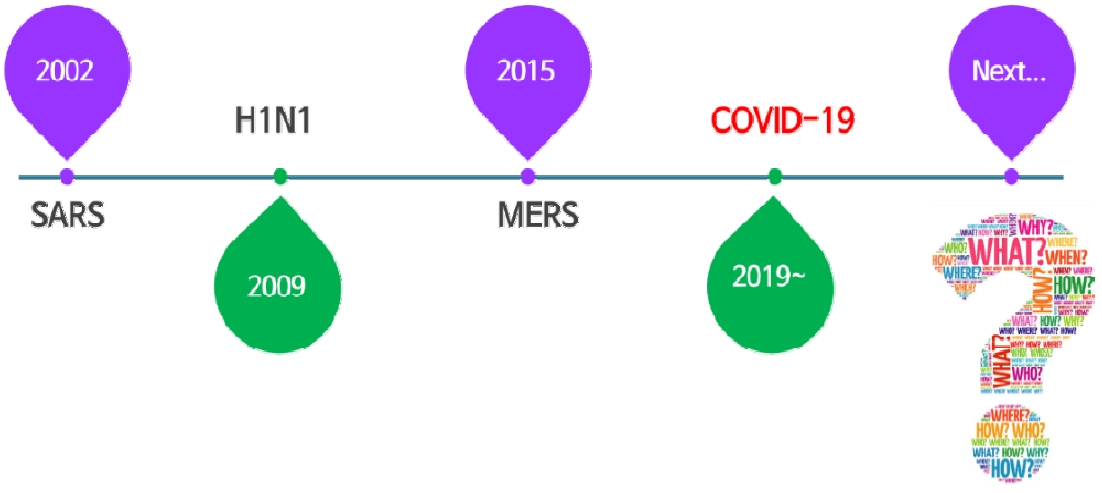Coronavirus disease 2019 (COVID-19), which has swept the world since December 2019, has caused suffering and death to millions of people worldwide over the past 2 years and has changed our lives. In 2021, the mandatory use of indoor and outdoor masks was lifted in the United States and Europe, and in 2022, the mandatory use of outdoor masks was wholly lifted in Korea as part of the transition to a post-COVID-19 environment. Although the World Health Organization has not officially declared the end of the COVID-19 pandemic, countries worldwide are now preparing for the future by proposing new healthcare policies in the post-COVID-19 era. Pediatric nurses are at the forefront of the COVID-19 pandemic, performing physical and mental patient care, maintenance of public health systems, education, and research to improve the health of children and their families. Pediatric nursing services have always sought a new paradigm in line with social changes, and the following pediatric nursing strategies are needed to prepare for the post-COVID-19 era.
1. Flexible Pediatric Nursing Response to New Pandemics
Pandemic cycles are becoming shorter and shorter. From severe acute respiratory syndrome (SARS) in 2002, influenza A (H1N1 virus) in 2009, and Middle East respiratory syndrome coronavirus (MERS-CoV) in 2015 to COVID-19 in December 2019, we have experienced periodic pandemics in the 21st century, and the danger of a new pandemic is always around us (Figure 1). Although therapeutics and vaccines for COVID-19 have been developed, their safety for children has yet to be fully established. It is unknown when a new virus may emerge. Children are particularly vulnerable to infectious diseases, and when an infectious disease occurs, they constitute the most challenging group to ensure the safety and efficacy of a vaccine. Therefore, flexible responses to care for children are required when a new pandemic crisis occurs. These nursing coping strategies may include appropriate isolation, nursing, and education for children and their families.
2. Development of New Pediatric Nursing Care Intervention Methods
Traditionally, pediatric nursing care has occurred in settings centered on hospitals and schools. However, in the COVID-19 situation, everything is non-face-to-face. The traditional pediatric nursing system stopped working, as it became too difficult to care for children in hospitals and schools. Therefore, developing new pediatric nursing care intervention methods for non-face-to-face situations became necessary. As a representative method, educational programs using online webinars, the metaverse, and similar technologies, can be cited as examples. This educational method can be applied to the development of non-face-to-face education programs for children with chronic diseases and for pre- and post-surgery education. Education using the metaverse has already been implemented in some hospitals, and these non- face-to-face programs have been shown to be effective in educating children with chronic diseases. Parents can also participate in the nursing care of their children. Unlike their parents' generation, children born after 2000 are digital natives. If we find various ways to deliver nursing interventions while satisfying their needs effectively, it will stimulate children's curiosity, arouse interest, and induce active participation.
In addition, various programs can be applied to education for new nurses and children. In addition to education using online webinars, as described above, augmented reality or virtual reality can be applied to emergencies and new nurse education programs for children's basic nursing.
3. Mental health Care for Children and Young People
Children and young people who receive pediatric nursing care belong to the so-called Generation Z. They are digital natives and actively communicate online. However, only 45% of Generation Z participants in an APA study from 2018 reported having exceptional or excellent mental health [1]. In other words, Generation Z did not have good mental health even before COVID-19. The impact of the COVID-19 pandemic on individuals, families, and communities has had multifaceted effects on children [2]. In particular, the isolation caused by COVID-19 can negatively impact children's mental health [3]. In addition, prolonged social isolation, as occurred during the response to COVID-19, can adversely affect children's mental health, leaving many students in a mental crisis. Some children are sensitive, afraid, or violent, in addition to having depression, anxiety, and high levels of stress [4]. For them, it is necessary to develop effective, age-appropriate crisis communication techniques, appropriate stress relief methods, and mental health care.
We have all been dealing with the crisis of COVID-19, and now we are waiting for its end. The new normal has already been established, and we cannot return to the pre-COVID-19 situation. The future is uncertain, but pediatric nurses must strive for the health of children and their families. We now have to adapt to the new era and be flexible. In order to deal with a new pandemic after COVID-19, we also need to devise an appropriate strategy. That is the mission and duty of a pediatric nurse.













